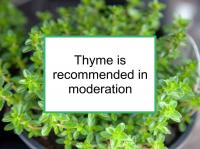Thyme (Thymus vulgaris) contains numerous compounds with antioxidant, anti-inflammatory, antimicrobial, and antifungal properties. Thyme is an excellent dietary source of luteolin, rosmarinic acid, thymol and ursolic acid, and a good source of apigenin and zeaxanthin. Thyme also contains some baicalein, beta-carotene, vitamin C and iron.
Luteolin has been shown to induce apoptosis (programmed cell death) in oral cancer calls, to promote cell cycle arrest and apoptosis in colon cancer cells, and to inhibit insulin-like growth factor 1 receptor signaling in prostate cancer cells. Ursolic acid has been shown to inhibit lung colonization of mouse melanoma cells. Apigenin has been shown to induce apoptosis in human skin, thyroid, gastric, liver, colon, cervical, and prostate cancer cells, and to inhibit migration and invasion of ovarian cancer cells.
Breast cancer-related effects of eating thyme
Epidemiological study
A major Italian population study reported that the risk of breast cancer was reduced for increasing intake of flavones such as the apigenin and luteolin found in thyme.
Apigenin and luteolin
Thyme components apigenin and luteolin have both been shown to induce apoptosis across a variety of breast cancer cell lines. For example, luteolin has been shown to increase programmed cell death in triple negative (ER-/PR-/HER2-) breast cancer cells, to reduce ER+/PR+ cell viability in a dose- and time-dependent manner, and to inhibit the growth, proliferation and migration of HER2+ breast cancer cells, as well as blocking their acquisition of stem cell-like properties. Luteolin has also been shown to inhibit angiogenesis (new blood vessel formation) and aromatase activity (in which androgens are converted into estrogens) in the laboratory. In addition, luteolin has been reported to increase the anti-cancer effects of the chemotherapy drug paclitaxel.
Apigenin has been shown to exhibit potent growth-inhibitory effects in HER2+ breast cancer cells. Apigenin has also been shown to inhibit the growth of patient-derived triple negative (ER-/PR-/HER2-) organoids and sensitize breast cancer cells to doxorubicin and paclitaxel chemotherapy. In addition, apigenin has been shown to lessen doxorubicin-induced kidney damage without reducing its cytotoxic effects against tumor cells in a mouse model of breast cancer.
Rosmarinic Acid
Thyme compound rosmarinic acid has been shown to inhibit proliferation and induce apoptosis of triple negative and ER+/PR+ breast cancer cells. Rosmarinic acid has also been demonstrated to reduce the viability and migration of triple negative breast cancer stem cells. In addition, rosmarinic acid has been shown to inhibit the migration of human bone-homing breast cancer cells in a dose-dependent manner.
Rosmarinic acid has also been reported to enhance the treatment effects of the chemotherapy drugs doxorubicin, cisplatin, 5-FU, paclitaxel and (docetaxel). In addition, rosmarinic acid has been demonstrated to reduce doxorubicin-induced cardiomyopathy without reducing its cytotoxic effects against ER+/PR+ breast cancer cells.
Thymol
Thymol has been demonstrated to inhibit the growth of both ER+/PR+ and triple negative breast cancer cells. It has been reported to induce apoptosis, halt the cell division cycle (i.e., cause cell cycle arrest), and inhibit metastasis by modulating critical signaling pathways. Combining thymol with carvacrol results in synergistic anticancer actions in both ER+/PR+ and triple negative breast cancer cells.
Ursolic acid
Ursolic acid has been shown to reverse multidrug resistance in breast cancer cells. For example, one study found that ursolic acid reversed resistance to paclitaxel in paclitaxel-resistant triple negative breast cancer. Another study reported that ursolic acid resensitized multidrug resistant ER+/PR+ breast cancer cells to doxorubicin. Still another study published in 2021 demonstrated that ursolic acid also increased the sensitivity of triple negative breast cancer cells to doxorubicin.
Carotenoids
Dietary beta-carotene has been found to be inversely associated with the risk of ER+/PR+ breast cancer. Dietary carotenoids such as beta-carotene have been found to inhibit the cancer-promoting effects of both estradiol and genistein (the phytoestrogen found in soy), thereby reducing their potentially harmful effects in hormone-dependent breast cancer.
Several studies of early stage breast cancer survivors have found that higher levels of cartenoids in the blood are associated with both lower risk of break cancer recurrence and lower risk of a new primary breast tumor. Plasma levels of retinol (a form of vitamin A that is a by-product of beta-carotene in the body) have also been found to be positively associated with breast cancer survival in postmenopausal women.
Additional comments
Even organic thyme tends to incorporate meaningful levels of heavy metals, which is why thyme should be consumed in moderation.
One 2020 study using a mouse model found that thyme extract inhibited the magnitude and frequency of oxytocin-induced uterine contractions more than controls, results which are suggestive but difficult to interpret in light of the relatively high doses used in the experiment (oxytocin has been shown to reduce proliferation of breast cancer cells). Based on the available evidence, the amounts of thyme normally used as a herb or spice in food probably are safe, however very frequent or highly concentrated uses (such as in thyme pesto sauce) might not be.
